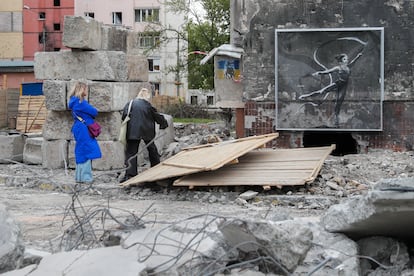Literature that describes how to lose a war and crumble an empire
The Russian invasion of Ukraine and Orbán’s nationalist drift in Hungary recall Miklós Bánffy’s ‘The Transylvanian Trilogy’ and earlier European conflict

A few weeks ago, Hungarian Prime Minister Viktor Orbán wore a scarf with the map of Greater Hungary on it to a soccer friendly against Greece. The provocative gesture sowed misgivings among the neighboring countries and regions that had formed part of the Austro-Hungarian Empire until World War I. During the great war, the empire crumbled and sent countless soldiers to the grave in the fighting that the Austro-Hungarian Empire’s territorial ambitions unleashed. Romania and Ukraine protested against Orbán’s gesture. Like them, Slovakia, Serbia, Austria, Croatia, Slovenia and Poland were all once part of Hungary and, therefore, represent important minorities.
Orbán explained himself by referring to the soccer match and tried to dissimulate, but we had all seen it. His display was just another sign of the Hungarian nationalism that the politician is reviving, one that empathizes with Putin’s own dangerous and aggressive Russian nationalism. Orbán’s gesture at the soccer game was not an isolated incident. He had previously shared similar images and approved policies that recapture the idea of old Hungary.
As the nationalist impulse in Hungary (and elsewhere in Europe) grows, one thinks of Miklós Bánffy’s The Transylvanian Trilogy, which addresses earlier moments of European nationalism and remains relevant as the continent heads toward similar crises.
It has been a century since the last Austro-Hungarian emperor died. He ruled over an empire with two languages and two Parliaments; in it, multiple minorities coexisted among too many disparate intentions, too many motivations and ambitions. Bánffy’s work addresses the Austro-Hungarian empire through the life of the young count and reformist politician Bálint Abády, the love of his life and his gambler cousin in the three long books. The centennial of the emperor’s death, along with the Ukrainian war and Orbán’s nationalist machinations, are as good a reason as any to revisit the novel from a 21st century perspective. Now, as the stability of the continent is shaken once again, it’s worth meditating on one of Europe’s great historical disasters: the crumbling of an empire, a country, a way of life and a culture. The empire broke down before many realized it was happening amid multiple divisions and struggles, which gave rise to new ones in the aftermath.

The Transylvanian Trilogy by Miklós Bánffy (1873–1950) did not receive great recognition when it was first published because of war, ruptures, censorship and the victory of the bad guys, but it can be appreciated now. Bánffy’s trilogy is necessary reading in these times of war in Europe, as Putin’s Russia tries to slowly advance on Ukraine as a prelude to reclaiming former Soviet spaces.
Bánffy himself exemplifies the fate that befell his country: born in the city of Kolozsvár, then in Hungary and now the Romanian city of Cluj-Napoca, he was an intellectual and foreign minister of his country. After World War II, he was trapped in his native Transylvania under the Soviet sphere of influence. In 1947, he managed to escape from Romania to Hungary, where he rejoined his family. But his books remained censored by communist regimes and only came to light in the 1980s. Since then, his works have sparked recognition that only continues to grow.
“Enjoying a long period of peace, no one believed in the danger of war,” the text asserts, in one of the book’s lines that continues to resonate powerfully in the present.
In the first of the three books, They Were Counted (written in 1934), great hunts, aristocratic balls, artists’ dreams, duels, races, banquets, luxury, gambling and frivolity dominate a society that believes that it is immune to the dangers of war and death. The young Bálint has plans to open up his region and fate seems to smile on everyone. Disagreements are still being settled in Parliament and Emperor Franz Joseph is only challenged in private. In the second tome, They Were Found Wanting (1937), the superpowers of the time are on the move while the Austro-Hungarian Empire’s alienated elites are navel-gazing, settling their quarrels and clashing without much thought for their citizens. The world moves forward while they entertain themselves, but danger lurks both within and outside the empire. In the third volume, They Were Divided (1940), disaster strikes Bálint, his love and the country, which implodes without knowing it yet. Austro-Hungary is so self-absorbed that it celebrates the war as the prelude to a new era of conquest and empowerment.
“Long live war!” shout the Hungarians celebrating that conflict has finally broken out. They believe that they are getting ready to fulfill their dreams. Their war cry is the same as Russia’s today; it is the same cry once uttered in Germany, Yugoslavia and even today’s more distant (but still connected) Sudan. Like Stefan Zweig in The World of Yesterday, Miklós Bánffy wrote it all down. He provided an instruction manual of everything we should not do. And of what we will do again.
Sign up for our weekly newsletter to get more English-language news coverage from EL PAÍS USA Edition
Tu suscripción se está usando en otro dispositivo
¿Quieres añadir otro usuario a tu suscripción?
Si continúas leyendo en este dispositivo, no se podrá leer en el otro.
FlechaTu suscripción se está usando en otro dispositivo y solo puedes acceder a EL PAÍS desde un dispositivo a la vez.
Si quieres compartir tu cuenta, cambia tu suscripción a la modalidad Premium, así podrás añadir otro usuario. Cada uno accederá con su propia cuenta de email, lo que os permitirá personalizar vuestra experiencia en EL PAÍS.
¿Tienes una suscripción de empresa? Accede aquí para contratar más cuentas.
En el caso de no saber quién está usando tu cuenta, te recomendamos cambiar tu contraseña aquí.
Si decides continuar compartiendo tu cuenta, este mensaje se mostrará en tu dispositivo y en el de la otra persona que está usando tu cuenta de forma indefinida, afectando a tu experiencia de lectura. Puedes consultar aquí los términos y condiciones de la suscripción digital.









































